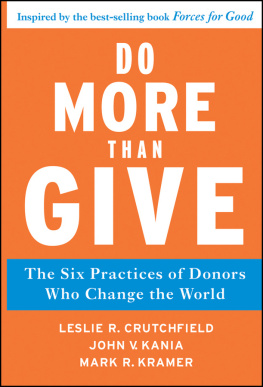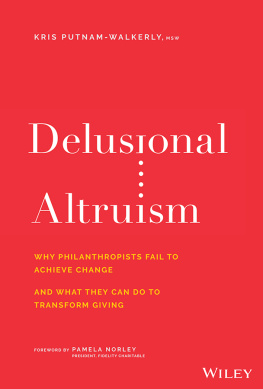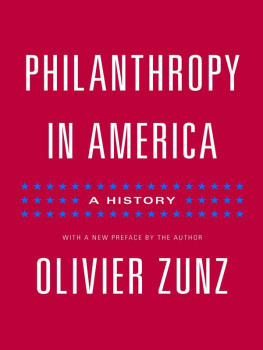REINVENTING PHILANTHROPY
RELATED TITLES FROM POTOMAC BOOKS
Business Behaving Well:
Social Responsibility, from Learning to Doing
Ron Elsdon, ed.
American Poverty:
Presidential Failures and a Call to Action
Woody Klein
Warfare Welfare: The Not-So-Hidden Costs of Americas Permanent War Economy
Marcus G. Raskin and Gregory D. Squires, eds.
Reinventing Philanthropy
A Framework for More Effective Giving
ERIC FRIEDMAN

2013 by Eric Friedman
All rights reserved
Potomac Books is an imprint of the University of Nebraska Press.
Library of Congress Cataloging-in-Publication Data
Friedman, Eric, 1977
Reinventing philanthropy: a framework for more effective giving /
Eric Friedman. First edition.
pages cm
Includes bibliographical references and index.
ISBN 978-1-61234-572-7 (hardcover: alk. paper) ISBN 978-1-61234-573-4 (electronic edition) 1. Charities. 2. CharitiesMoral and ethical aspects. 3. Nonprofit organizations. 4. Voluntarism. I. Title.
HV41.F686 2013
361.7dc23
2013019243
Printed in the United States of America on acid-free paper that meets the American National Standards Institute Z39-48 Standard.
Potomac Books
22841 Quicksilver Drive
Dulles, Virginia 20166
First Edition
10 9 8 7 6 5 4 3 2 1
For those donating to make
the world a better place: may
your philanthropic success drive
your personal fulfillment.

And for my daughter, who,
as I write this, is growing and
kicking in utero: may the future
always improve on the past.
Contents
Preface
To give money away is an easy matter and in any mans power. But to decide to whom to give it, and how large, and when, and for what purpose and how, is neither in every mans power nor an easy matter.
attributed to Aristotle
Philanthropy is broken and almost everyone involved knows it. Fundraisers know that the causes that get the most donations are not necessarily the ones that make the greatest impact. Many donors recognize that they do not know how to define what high-performing nonprofits are, let alone how to identify them. Nonprofit program staff members know that tremendous resourcesboth time and moneyare diverted from their programs in order to engage and solicit donors. Longtime observers of the philanthropic world know that the personal whims and preferences of donors determine where dollars flow regardless of need or impact. Philanthropy isnt working as it should, and it needs to be reinvented.
Donors share the blame. No one holds donors accountable; its their money, so they can do with it as they choose. Donors control the money, so charities adapt to their behavior, regardless of whether it is good or bad. Rarely do donors receive critical feedback: organizations they donate to (or consider donating to) are reluctant to say anything that might reduce potential donations, and organizations they dont (or wont) consider donating to have no reason to interact with them. Most donors get plenty of appreciation from the recipient organizations, but no substantive feedback. Unfortunately, todays dominant paradigm of philanthropy presents as axiomatic the idea that donors should give to the causes they care about and have personal ties to, rather than trying to make the biggest dent in the causes most effective at helping others.
Is philanthropy about helping those in need or pursuing the personal passions of those with enough money to give away? If it is the former, then shouldnt a central tenet be to try to provide the most help possible? Is there an alternative framework that focuses on the recipients, assessing who is most in need of help and how donors can make the most impact?
Changing donors behavior must start with the donors. Donors should critically analyze their own motivations and actions. Are their motivations more selfish than altruistic? How can donors know when their personal biases impede their ability to give effectively? What conditions, if any, should donors attach to their gifts to ensure the highest and greatest use for the donation? Which behaviors impose undue burdens on the organizations they work with?
As a donor, Ive struggled with many of these issues myself. This book is the culmination of my thinking, and it challenges many commonly accepted views about philanthropy. It is written by a donor, about donors, and for donors who want to look critically at what they can do to improve their philanthropy. Although effective philanthropy can bring donors benefits such as tax breaks, public recognition, and emotional fulfillment, this book is not written for people who treat these items as more important than maximizing the positive impacts of their giving.
Within the philanthropic community, there is an extreme fear of being judgmental. The social rules of order are that almost anyone who is trying to do good is beyond criticism. A donor who chooses to give to a well-endowed art museum instead of helping those in extreme poverty who are dying of preventable diseases cannot be criticized, as that donor is doing more good than the person who doesnt give to either cause. And any donor who is also a criticmyself includeddelivers his or her critique from an equally vulnerable glass house. The resulting code of silence suffocates constructive discourse, harming the philanthropic community and the world it is trying to serve.
In the spirit of helping others, I will break the social rules of order and state my opinions in this book. With respect to the donor who gives to a well-endowed art museum instead of helping those in extreme poverty who are dying of diseases that are easily preventable or curable, I believe that person is doing more good than the person who gives nothing. But not much more goodat least, not relative to the amount of good they could be doing with an equal-value donation to other causes. And I dont think that my position is unreasonable, unfair, or inappropriately judgmental.
I think the relative merits of supporting art museums versus saving people dying of diseases that are easily preventable or curable are pretty clear. Both are good causes, but one is likely to do a lot more good than the other. However, there is a slippery slope with this type of critique. Where do we draw the line between constructive commentary and inflammatory rhetoric?
This book includes many stories about real philanthropists. The examples incorporate role models, ineffective donors, and donors who meet objectives based more on their own personal preferences than on what would help others most. These stories help illustrate not only the type of philanthropy that Im advocating, but also differentiate it from the typical philanthropy that needs to be reinvented. These antirole models are not dishonest or corrupt; in most cases, they engage in fairly common philanthropic behavior. But certain aspects of this behavior reduce its capacity for improving the world. My intention is not to personally attack these donors. Rather, I want to challenge broader cultural beliefs in the philanthropic sector, and the approaches of these donors are symptomatic of common practice. They are generous people trying to do good things, and for that they should be commended. But this book is not about effort or intent; it is about impact. While writing it, there were times when I felt like a bit of a jerk, as I criticized well-intentioned, compassionate people. And though you, too, may perceive some of the illustrations to be meanspirited or inappropriate, that is not my goal. Instead, I ask you to take the book in the manner it is intended: to illustrate points to make the world better by improving philanthropy.
Next page





